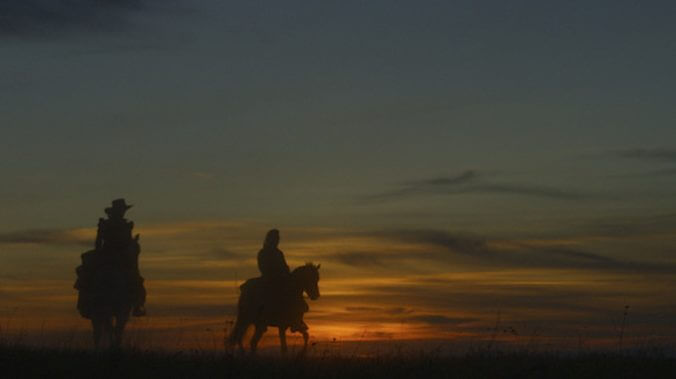Writer and Director Hugo Blick on Modernizing the Western in The English
Photo Courtesy of Prime Video
Prime Video’s The English is an epic chase Western with the theme of revenge seated at its core. The six-episode series stars Emily Blunt as the aristocratic Lady Cornelia Locke, an Englishwoman set on tracking down the man she believes to have killed her child, and Chaske Spencer as Eli Whipp, a Pawnee ex-cavalry scout seeking to claim land that has been promised to him following his service. The duo find themselves facing a variety of unforgiving obstacles as they travel together across the violent landscape of 1890 middle America.
The miniseries is the latest from writer and director Hugo Blick, who is most notable for political thrillers such as The Honourable Woman and Black Earth Rising. He’s always wanted to make a Western and has finally found the perfect story to tell. During a recent press junket, Paste sat down with Blick to discuss creating The English and modernizing the Western genre.
Note: This interview has been lightly edited for length and clarity.
![]()
Paste: What was the catalyst behind writing The English? Why was this the story you wanted to tell?
Hugo Blick: Well, I‘ve always wanted to make a Western. The actual time of the cowboy was actually 30 years, and the 130 that followed was about the myth, and the myth has been in our cinemas and our frontrooms. Maybe I had a misspent youth, because I spent nearly all of my life in a front room watching Westerns. To me, it was everything. It was how I understood to orient my life in the world. The idea, once I became a filmmaker, to make one… Well, it was just a privilege beyond expectation. So I’ve always wanted to make a Western.
I think the reason they’re successful is because they’re elevated. They’re operatic. Jimmy Stewart said that the Western is the purest form of cinema. I think he meant that because it’s about one man in the landscape. And the bigger the landscape, the greater the pressure (psychological) upon the man. I took to that. I think that’s absolutely right. These are big, operatic myth themes. I suppose the difference with The English is that instead of the great Jimmy Stewart, we have an Englishwoman played by Emily Blunt and then—perhaps significantly for the above the title lead role that it is—a Native American man played by Chaske Spencer. The stories are always about revenge. The cowboy theme is revenge. I suppose again, The English is kind of unusual, or at least it’s taking on the genre a step further, in that it’s who it chooses to be its heroes and exactly the type of revenge it is ordered, justice that needs restoring. So there we are, that’s why The English got made.
Paste: A crucial part of stories like these is in its historical accuracy and overall sensitivity, especially towards the Indigenous tribes and groups being represented. How did you go about researching and developing these aspects of the show?
Blick: First off, it’s an adventure. It’s an exploration of the genre, it’s not a social documentary. This is an elevated space, that’s what a Western is. However, within that aspect, there is of course those themes of Native representation because if we’re absolutely honest, if we look back at the genre, its Native representation isn’t great. The history isn’t great. I wanted to explore and interrogate that.
To do that, first I researched the scripts for myself in order to construct them to a place—which I hesitate to say, is like Smithsonian-levels of research because it makes me seem like I’m a buff ; on the other hand, it’s true. I did go to the Smithsonian so maybe that’s true—but in the end, once I had the scripts ready, we had to place them in the right hands to really scrutinize for authenticity and sensitivity, as you just described.
We approached IllumiNative, a Native-led social organization for promoting representation within the media space. Crystal Echo Hawk, who is the CEO and also herself a member of the Pawnee-nation (and because Chaske Spencer’s character is depicting a member of the Pawnee Battalion), was able to immediately engage in the scripts and in the project. We spoke to her and her team. She passed the project on, once we were engaged positively, onto a Pawnee team led by a woman named Maggie Cunningham and through others. There was Taylor Moore, Mac Reed, Zach Rice, who really took me through the granular nature of the script from the Pawnee perspective. And from the Cheyenne perspective, because there’s that aspect within the story too, we met with Gordon Yellowman and Adrian Orange to ensure that those aspects were also representative within the genre.
-

-

-

-

-

-

-

-

-

-

-

-

-

-

-

-

-

-

-

-

-

-

-

-

-

-

-

-

-

-

-

-

-

-

-

-

-

-

-

-








































